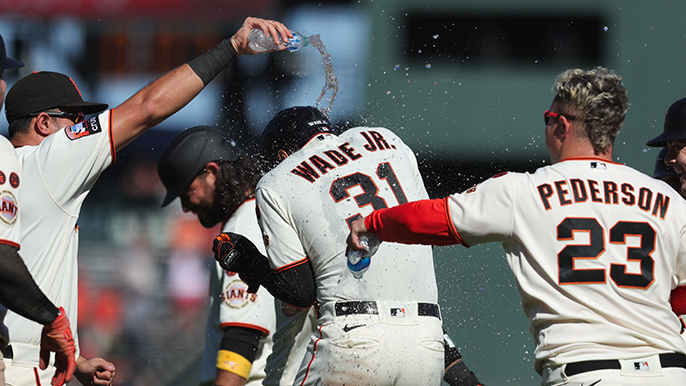
Entire seasons can rise and sink on the bundles of moments that decide can-go-either-way games.
The Giants and Padres have shown both sides of that coin flip this season.
San Diego, with one of the most expensive and talented rosters in MLB, has gone 0-11 in extra-innings games. They’re 6-22 in contests decided by one or fewer runs.
If San Diego’s record in one-run games flipped, they’d have 84 wins — ahead of the wild card pack and threatening the Dodgers’ top spot in the National League West.
The Giants, meanwhile, have cobbled together win after win in tight games. They won two one-run, extra-innings games to take the series against the Cleveland Guardians, both of which ended on LaMonte Wade Jr. walk-offs.
On the season, the Giants are 11-3 in extras and 22-17 in one-run games.
These are the margins that turn contenders into disappointments, .500 teams into surprises. The Giants, so far, have been the latter as the phenomenon has shaped the National League playoff picture.
“I don’t know what it is about this team, but this is something that I think is worth being really optimistic about,” Giants manager Gabe Kapler said Wednesday. “When we get into those very close battles, first: we don’t give up. There’s a bunch of fighters in that room, and those guys are consistently battling. Then second, when we get close, we close out games pretty well. We close out games with our pitching staff pretty well, we close out games with big hits, with everything on the line in extra innings pretty well. That’s the signal of a solid, fighting team.”
Kapler’s comments came after San Francisco’s 6-5 win over the Guardians in extra innings. To beat Cleveland, the Giants used a stellar performance from Alex Wood out of the bullpen to keep them within striking distance, a clutch home run from J.D. Davis, an aggressive usage of Camilo Doval and situational hitting in the bottom of the 10th.
“I think we’re going to look back on this game at the end of the season and believe that it’s very, very meaningful,” Kapler said.
Winning close games is a skill. Particularly in extra-innings games, the Giants have a plethora of pitching options they can be confident in, which allows them to use Doval in either the ninth, 10th or both. That’s an important roster construction quirk that undoubtedly gives SF an edge over comparable teams with shakier pitching staff situations.
They also have veteran hitters who understand the assignment of keeping scoring chances alive. In Wednesday’s 10th inning, Davis drew a tough walk after falling behind in the count 0-2. Brandon Crawford, showing bunt the entire way, followed him with another walk. Over the course of his 13-year career, he’s earned the trust to come through — one way or another.
Then Wade, knowing he had to lift a ball into the air to win the game, went with a well-located outside slider, launching it just far enough to left field. In the opener, he executed a different situation with a different approach it required, driving a ball up the middle for a walk-off single.
Is there anything unique about the Giants that helps them succeed in tight or extra-inning games?
“Yeah, I mean, taking a page out of the first half, we were so good — we’re still good — at not letting the other team, even if they get ahead or hit us first, not really stay down,” Davis said. “To get back up and just kind of trade blows back-and-forth. It’s going to be okay. I think when we get ahead of ourselves is when we get too aggressive. But when we stay selectively aggressive as an offense, as a team, that’s when we can kind of domino effect. I think that just speaks volumes of how this group of guys are, that we’re grinding, we all want to be a tough at-bat in the lineup, just kind of the same thing: pass the baton, it’s always been the saying.”
Davis added: “We’ve been preaching the same thing over and over again. We’ve gotten away from it here and there, it’s been streaky. But for the most part, I think we’ve been kind of cool and collected and had the same approach as an offense.”
That may all be true. But there is also a healthy amount of luck involved.
San Diego’s record in one-run games is one of the worst in baseball history. Per Inside Edge, the Padres .214 winning percentage in such tight games is the second-lowest since 1901.
A non-zero portion of that can be explained by luck and regression. Last year, the Padres went 30-17 in one-run games, the best mark in MLB. They have the same manager, Bob Melvin, and an improved roster.
For as often as the Giants have delivered with clutch hits and aggressive managing, the Padres are trying to do the same thing — with more talented players. They simply must be the victims of at least some unfortunate luck. Manny Machado, Juan Soto, Xander Bogaerts, Fernando Tatis Jr. and Josh Hader are also plenty capable of passing the baton and performing in the biggest moments.
“I don’t think it’s any one thing in isolation, I think there’s certainly some chance involved in any close game,” Kapler said.
Luck, skill, magic or otherwise, the vastly distinct outcomes in close games is why the Padres are where they are. It also could be one of the most powerful reasons the Giants reach the postseason.

